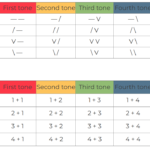Articles in the ‘Speaking’ category Page 4
-
How to improve fluency in Chinese by playing word games
What if I told you that there is a game that helps you speak Chinese more fluently, is great for improving communicative ability and works well regardless of your current level? What if I said that the game is also fun and free to play?
Read → -
The building blocks of Chinese, part 5: Making sense of Chinese words
How many characters do you need to know to be able to read Chinese? The truth is that characters only provide a foundation, so regardless of how many you know, you won’t be able to read much unless you also know many words.
Read → -
Using voice messaging as a stepping stone to Chinese conversations
Being able to have a conversation is a goal for most students of Chinese, be it with loved ones, for professional purposes or for travel, but what if you think conversations are too scary, too difficult or just impractical? Try using voice messaging as a stepping stone to better conversations in Chinese!
Read → -
A smart method to discover problems with Mandarin sounds and tones
It’s often hard to assess one’s own pronunciation when learning Mandarin. People around you might understand what you are saying, but that doesn’t necessarily mean your tones are good. Simply asking people if your pronunciation is good won’t work either, because they will often tell you that your pronunciation is good even if it’s not. So how can you find out how good your pronunciation really is?
Read → -
Chinese language logging, part 3: Tools and resources for keeping track of your learning
Logging you language learning can be very useful, and there are many tools and resources out there to help you, but which are the best and how do you use them?Logging you language learning can be very useful, and there are many tools and resources out there to help you, but which are the best and how do you use them?
Read → -
The importance of tones is inversely proportional to the predictability of what you say
Tones in Mandarin carry roughly as much information as vowels do, but still some people insist that tones are not very important, or even that native speakers don’t really use tones. Why is that and what can we learn from digging deeper into this misconception?
Read → -
Lost in transcription: Saylaw, Ice Island and Aristotle
Names of people and places can be quite different in different languages, sometimes so different that it causes headaches for second language learners. Do you know the world’s best footballer, Saylaw? What about Yàlǐshìduōdé? Or are you lost in transcription too?
Read → -
Chinese language logging, part 1: Why and how to track your progress
How much time are you investing into learning Chinese? Or is it maybe better to talk about it using a unit other than time, such as how many books you’ve read? Are you reading more than you’re writing? Or is listening, speaking, reading and writing maybe the wrong labels to use?
Read → -
What’s the difference between Chinese pronunciation and Pinyin? Does it matter?
It’s not uncommon for both students and teachers to treat Chinese pronunciation and Pinyin as the same thing, but they are not, and thinking that they are can lead to certain problems.
Read → -
Learning the second tone in Mandarin Chinese
Many students of Chinese struggle with the third tone, but almost as many also have problems with the second tone. So how should the second tone be pronounced, and what are the most common learner errors?
Read →









